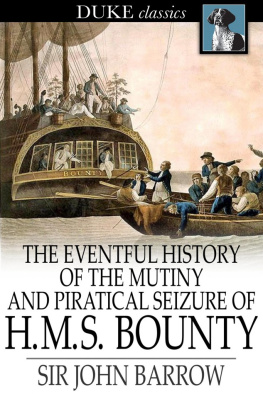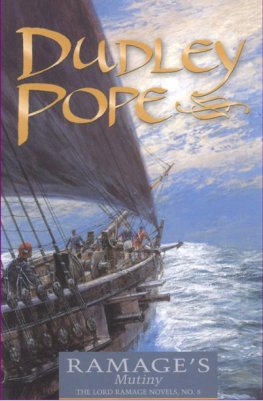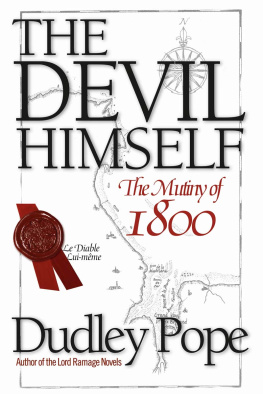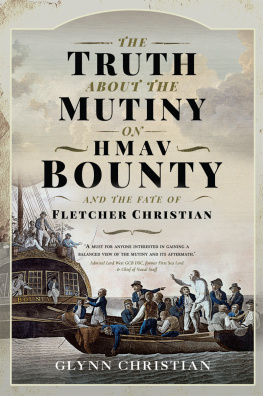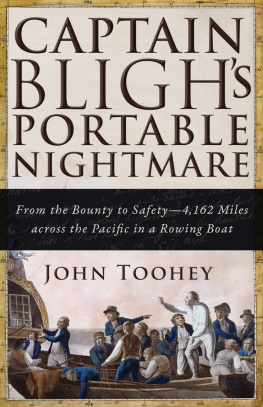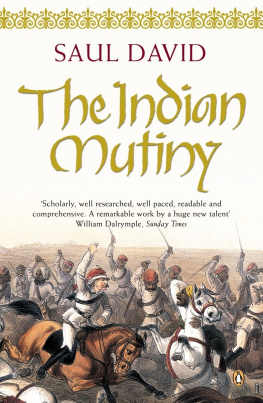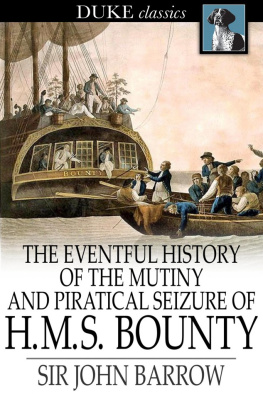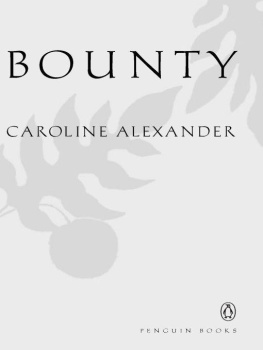THE EVENTFUL HISTORY OF THE MUTINY AND PIRATICAL SEIZURE OF H.M.S. BOUNTY
ITS CAUSE AND CONSEQUENCES
* * *
SIR JOHN BARROW
*
The Eventful History of the Mutiny and Piratical Seizure of H.M.S. Bounty
Its Cause and Consequences
First published in 1831
ISBN 978-1-62012-144-3
Duke Classics
2012 Duke Classics and its licensors. All rights reserved.
While every effort has been used to ensure the accuracy and reliability of the information contained in this edition, Duke Classics does not assume liability or responsibility for any errors or omissions in this book. Duke Classics does not accept responsibility for loss suffered as a result of reliance upon the accuracy or currency of information contained in this book.
Contents
*
Preface
*
The Editor of this little volume (for he presumes not to write Author)has been induced to bring into one connected view what has hithertoappeared only as detached fragments (and some of these not generallyaccessible)the historical narrative of an event which deeplyinterested the public at the time of its occurrence, and from which thenaval service in particular, in all its ranks, may still drawinstructive and useful lessons.
The story in itself is replete with interest. We are taught by TheBook of sacred history that the disobedience of our first parentsentailed on our globe of earth a sinful and a suffering race: in ourtime there has sprung up from the most abandoned of this sinfulfamilyfrom pirates, mutineers, and murderersa little society which,under the precepts of that sacred volume, is characterized by religion,morality, and innocence. The discovery of this happy people, asunexpected as it was accidental, and all that regards their conditionand history, partake so much of the romantic as to render the story notill adapted for an epic poem. Lord Byron, indeed, has partially treatedthe subject; but by blending two incongruous stories, and leaving bothof them imperfect, and by mixing up fact with fiction, has been lessfelicitous than usual; for, beautiful as many passages in his Islandare, in a region where every tree, and flower, and fountain breathepoetry, yet as a whole the poem is feeble and deficient in dramaticeffect.
There still remains to us at least one poet, who, if he could beprevailed on to undertake it, would do justice to the story. To hissuggestion the publication of the present narrative owes its appearance.But a higher object at present is engaging his attention, which, whencompleted, judging from that portion already before the public, willhave raised a splendid and lasting monument to the name of WilliamSotheby, in his translation of the Iliad and the Odyssey.
To the kindness of Mrs. Heywood, the relict of the late Captain PeterHeywood, the Editor is indebted for those beautiful and affectionateletters, written by a beloved sister to her unfortunate brother, while aprisoner and under sentence of death; as well as for some occasionalpoetry, which displays an intensity of feeling, a tenderness ofexpression, and a high tone of sentiment that do honour to the head andheart of this amiable and accomplished lady. Those letters also from thebrother to his deeply afflicted family will be read with peculiarinterest.
Chapter I - Otaheite
*
The gentle island, and the genial soil,
The friendly hearts, the feasts without a toil,
The courteous manners but from nature caught,
The wealth unhoarded, and the love unbougnt,
* * *
The bread-tree, which, without the ploughshare, yields
The unreap'd harvest of unfurrow'd fields,
And bakes its unadulterated loaves
Without a furnace in unpurchased groves,
And flings off famine from its fertile breast,
A priceless market for the gathering guest;
These, etc. BYRON.
The reign of George III will be distinguished in history by the greatextension and improvement which geographical knowledge received underthe immediate auspices of this sovereign. At a very early period, afterhis accession to the throne of these realms, expeditions of discoverywere undertaken, 'not (as Dr. Hawkesworth observes) with a view to theacquisition of treasure, or the extent of dominion, but for theimprovement of commerce, and the increase and diffusion of knowledge.'This excellent monarch was himself no mean proficient in the science ofgeography; and it may be doubted if any one of his subjects, at theperiod alluded to, was in possession of so extensive or so well-arrangeda cabinet of maps and charts as his was, or who understood their meritsor their defects so well as he did.
The first expeditions that were sent forth, after the conclusion of thewar, were those of Byron, Wallis, and Carteret. In the instructions tothe first of these commanders it is said, 'there is reason to believethat lands and islands of great extent, hitherto unvisited by anyEuropean power, may be found in the Atlantic Ocean, between the Cape ofGood Hope and the Magellanic Strait, within the latitudes convenient fornavigation, and in climates adapted to the produce of commodities usefulin commerce.' It could not require much knowledge or consideration to beassured that, between the Cape and the Strait, climates producingcommodities useful in commerce, with the exception of whales and seals,were likely to be found. The fact was that, among the real objects ofthis and other subsequent voyages, there was one which had engaged theattention of certain philosophers, from the time of the Spanishnavigator, Quiros: this able navigator had maintained that a TerraAustralis incognita must necessarily exist, somewhere in the highlatitudes of the southern hemisphere, to counterbalance the greatmasses of land in those of the northern one, and thus maintain a justequipoise of the globe.
While these expeditions were in progress, the Royal Society, in 1768,addressed an application to the king, praying him to appoint a ship ofwar to convey to the South Seas Mr. Alexander Dalrymple (who had adoptedthe opinion of Quiros), and certain others, for the main purpose,however, of observing the transit of Venus over the sun's disc, whichwas to happen in the year 1769. By the king's command, a bark of threehundred and seventy tons was taken up by the Admiralty to perform thisservice, but, as Mr. Dalrymple was a civilian, he could not be entrustedwith the command of the ship, and on that account declined going in her.
The command was therefore conferred on Lieutenant James Cook, an officerof undoubted ability, and well versed in astronomy and the theory andpractice of navigation, with whom the Royal Society associated Mr.Charles Green, who had long been assistant to Dr. Bradley, theastronomer royal, to aid him in the observation of the transit. Mr.Banks, a private gentleman of good fortune, who afterwards became thevaluable and distinguished President of the Royal Society, and Dr.Solander, a Swedish gentleman of great acquirements, particularly innatural history, accompanied Lieutenant Cook on this interesting voyage.The islands of Marquesas de Mendoza, or those of Rotterdam or Amsterdam,were proposed by the Royal Society as proper places for making theobservation. While fitting out, however, Captain Wallis returned fromhis expedition, and strongly recommended as most suitable for thepurpose, Port Royal Harbour, on an island he had discovered, to which hehad given the name of 'King George's Island,' and which has since beenknown by its native name, Otaheite

